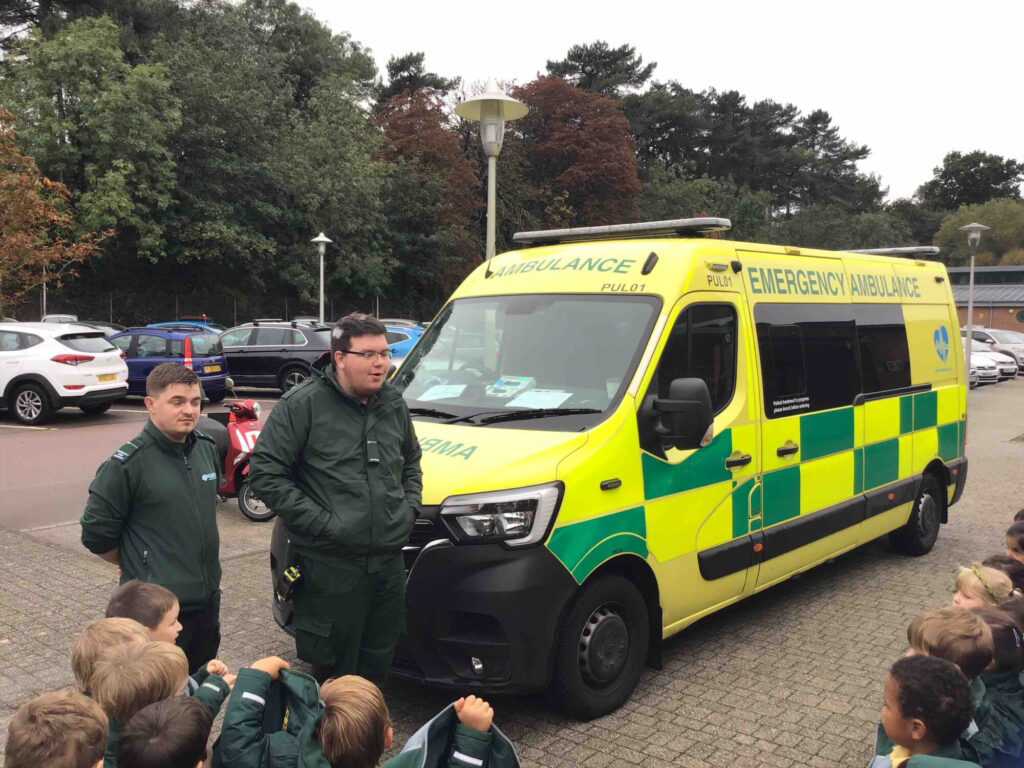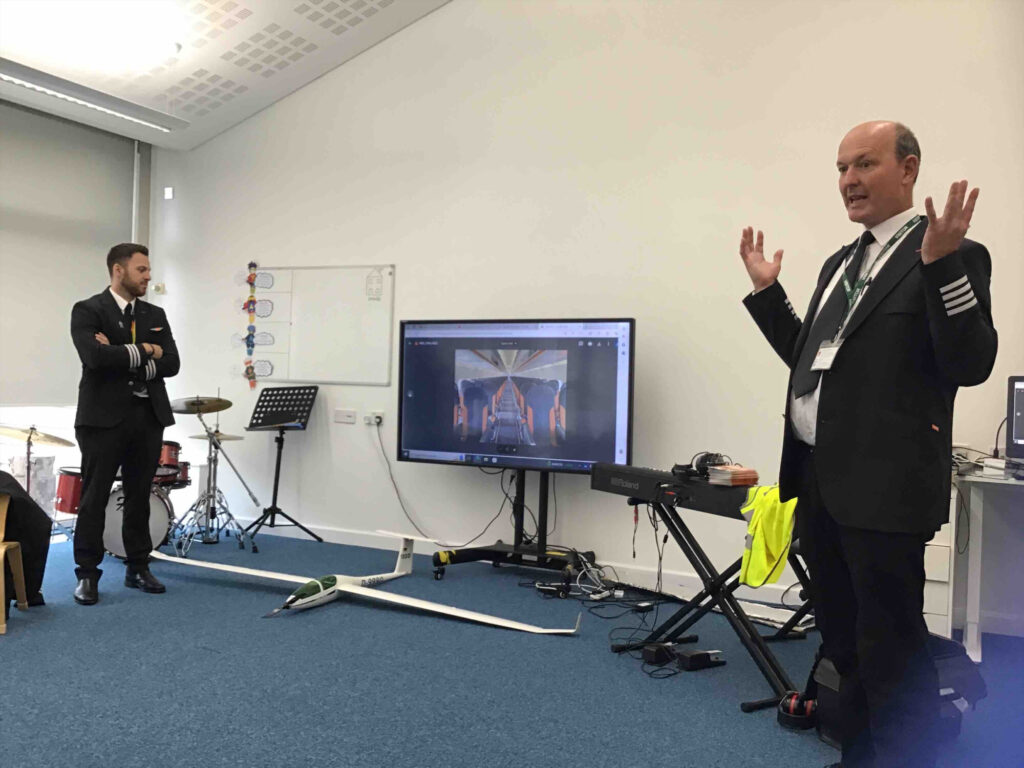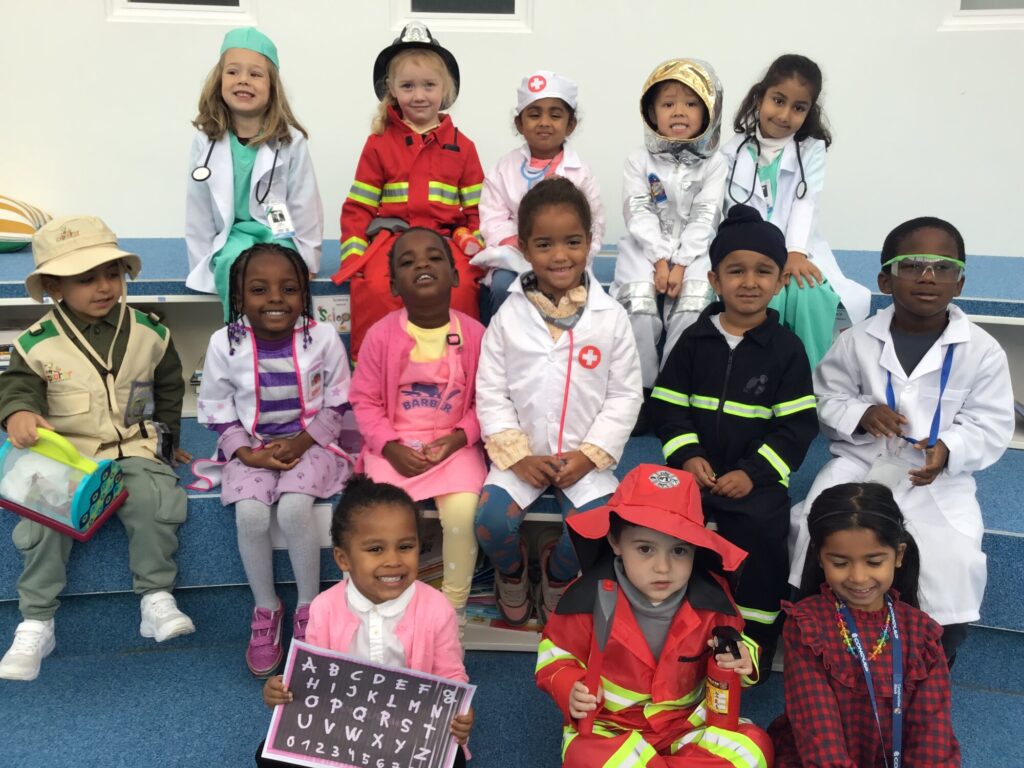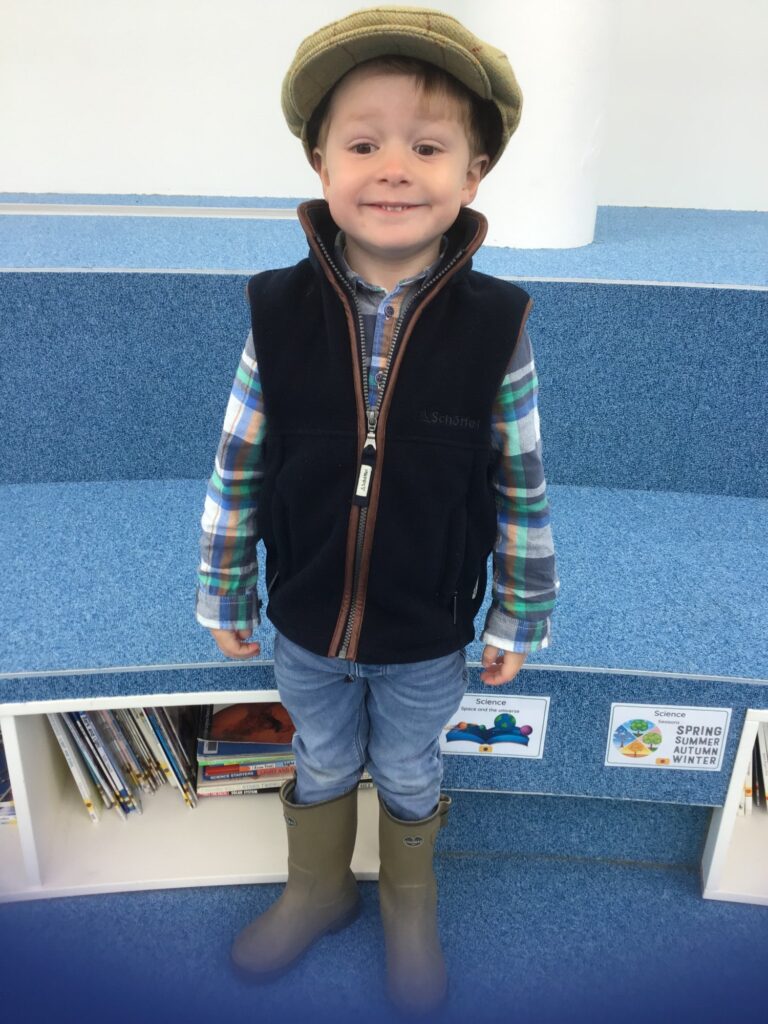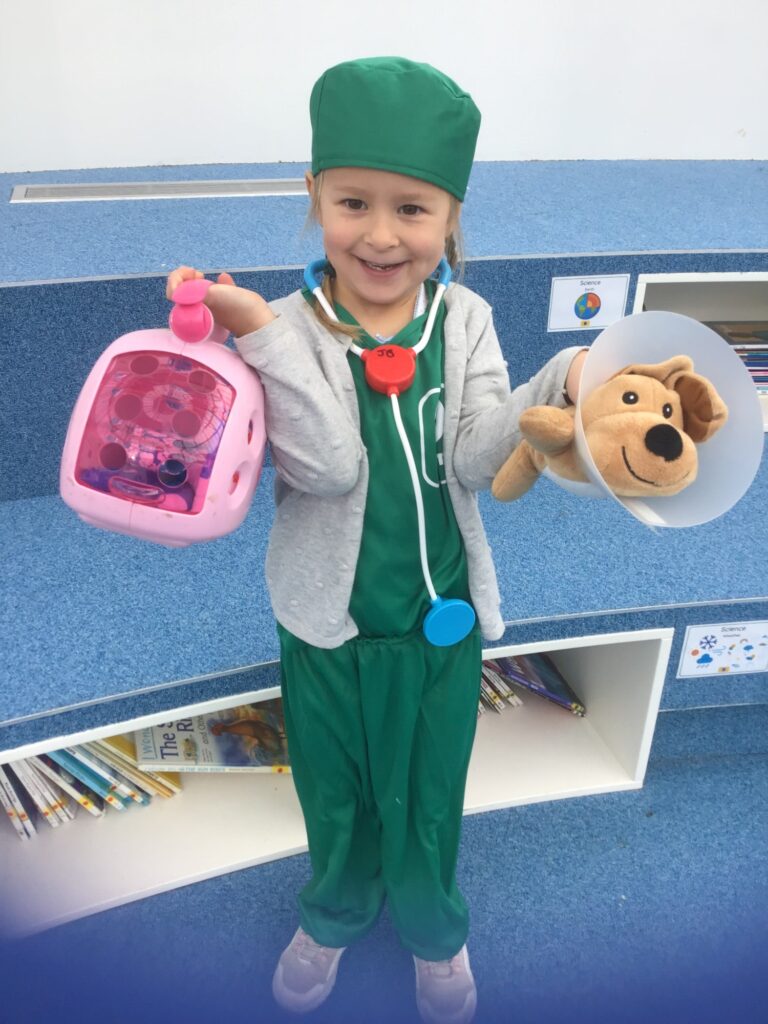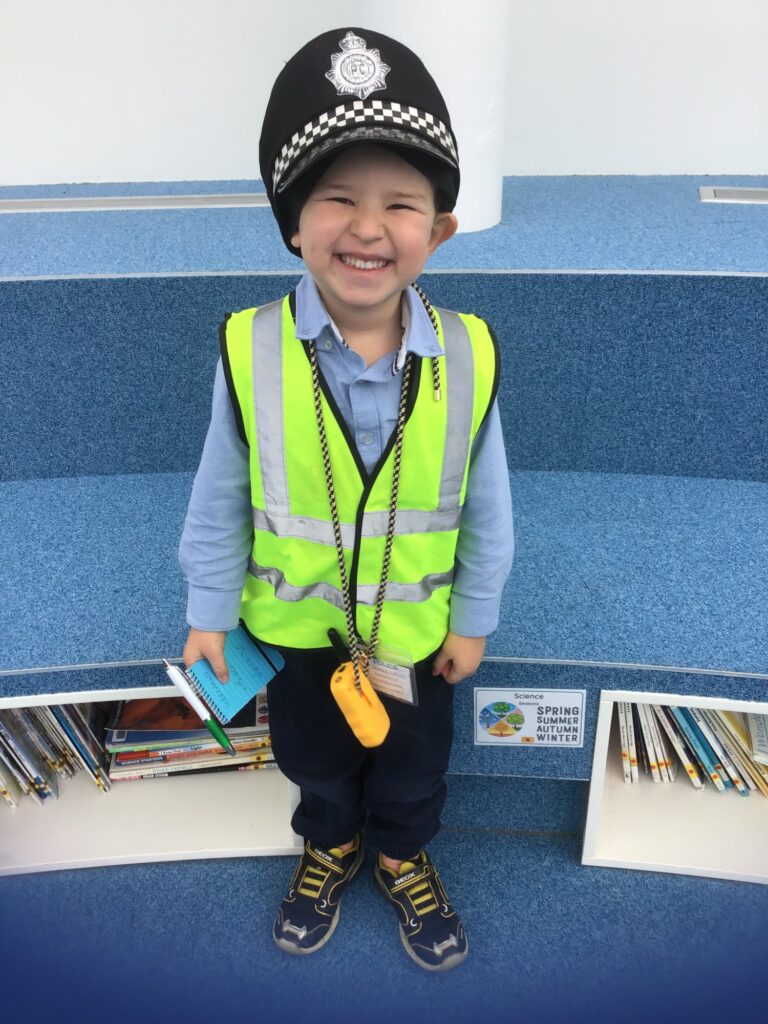As we welcome spring, we are looking forward to taking our learning and play outdoors even more – we can’t wait to see what we will discover!
Here, our Headteacher, Jo Webster, explains the role of outdoor play in cognitive development for Early Years.

With the clocks going forward and the change of the seasons upon us, we are definitely experiencing spring here at Pilgrims.
Our outdoor areas are beginning to look green and fresh, and our wildlife pond is brimming with new life.
The great outdoors offers endless opportunities for exploration, creativity and learning for our children. From running around the school field to playing in our mud kitchen, outdoor play not only promotes physical health but also plays a crucial role in cognitive development.
Enhancing cognitive skills
Engaging in outdoor play promotes the development of various cognitive skills which are essential for our Early Years learners.
For example, navigating uneven terrain and climbing structures helps improve spatial awareness and problem-solving abilities.
Playing with natural materials such as sand, water and sticks stimulates creativity and imagination.
Outdoor play fosters a sense of resilience and adaptability as children learn to navigate unpredictable environments and overcome challenges.
Social and emotional development
Beyond cognitive development, outdoor play also supports social and emotional growth.
Outdoor spaces provide lots of opportunities for cooperative play, communication and conflict resolution.
Whether it’s negotiating roles in a pretend play scenario or working together to build a den, children learn important social skills that are crucial for forming friendships and navigating social interactions.
Encouraging curiosity and exploration
Outdoor play encourages children to ask questions, explore their surroundings and make discoveries independently.
Unlike structured indoor activities, outdoor play allows children to follow their curiosity and discover things which interest them.
Whether it’s observing insects, building forts or collecting rocks, these experiences foster a sense of wonder and curiosity that lays the foundation for a lifelong love of learning.

How Pilgrims supports outdoor play and learning
Our curriculum is divided between indoor and outdoor learning and is designed to encourage the children’s imagination and creativity.
One of our school values is ‘curiosity’ and our curriculum is built on this basis. From growing fruit and vegetables to going on sensory walks, and from den-building and mini beast hunts on the field to climbing trees – it all happens at Pilgrims!
We are also proud to be a Forest School. The Forest School approach uses the natural environment and outdoor facilities to offer children an alternative approach to learning. We aim to inspire the children to build a respect for nature and a passion for the outdoors.
We are also extremely fortunate to have our own school pond and wildlife area for the children to discover new creatures and learn about plant life.
The outdoors provides our children with a rich and dynamic learning space. Unlike indoor settings, the outdoors is constantly changing, creating curiosity and opportunity for lots of things to be discovered.
From fostering exploration to enhancing cognitive skills and promoting social-emotional development, outdoor play offers a multitude of benefits for Early Years children.
Learn more about our curriculum here.
Reading plays such an important part in a child’s development.
Not only does it teach them how to form words and sentences, it helps concentration while strengthening the memory and encouraging imagination and creativity.
Here, to celebrate World Book Day, Mrs Webster looks at the power of reading with your child.
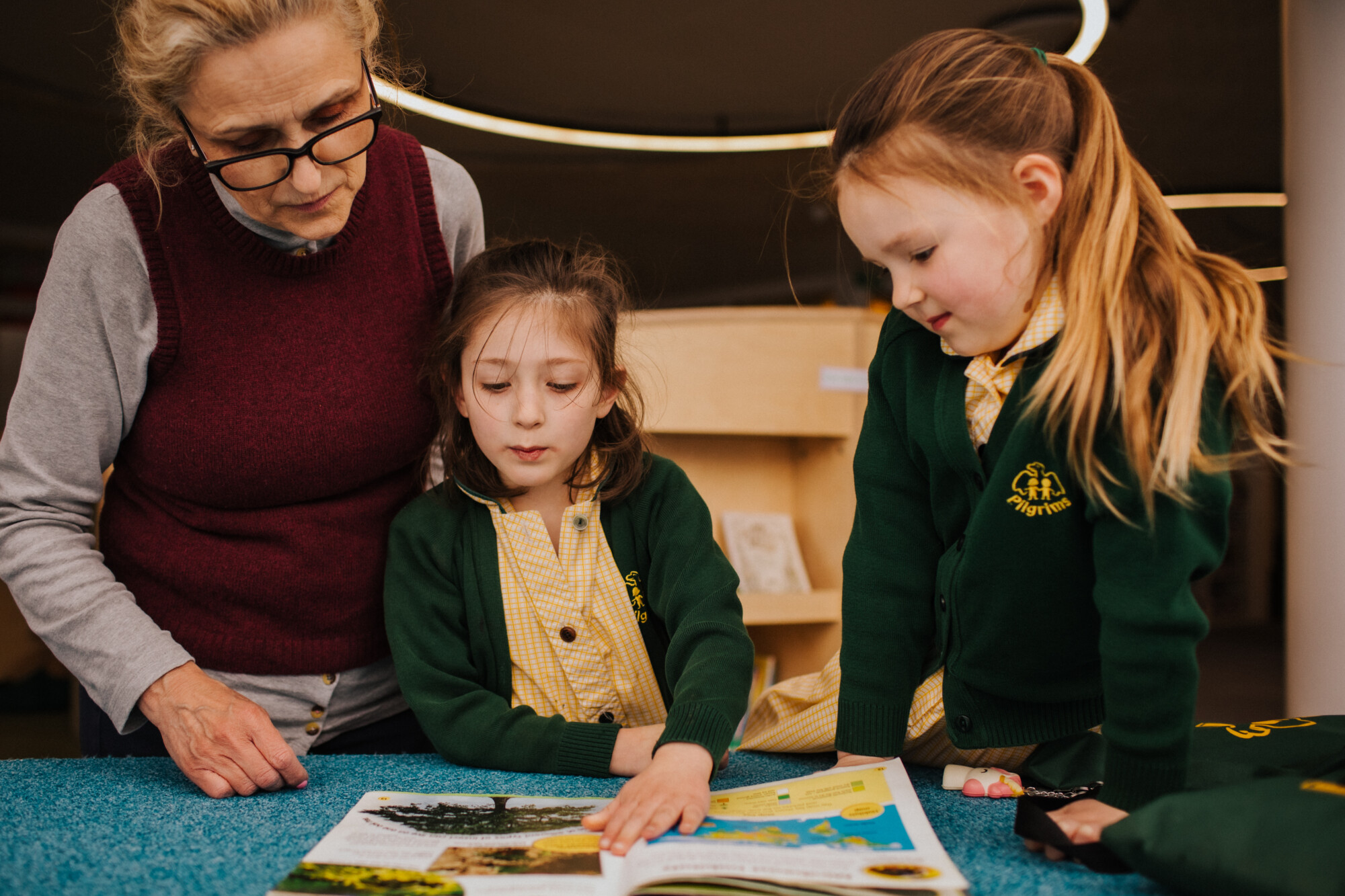
From babies to children in their early years and through to early teens, reading brings a wide range of benefits that can have a lifelong positive impact.
At Pilgrims, we foster a love for learning. We recognise the correlation between reading and academic success is unmistakable.
As the saying goes – practice makes perfect, so the more books your child reads at home, the faster they will learn, and this will help them at school.
Emotional development
Beyond academic benefits, shared reading fosters emotional development.
Children who engage in reading with their families are more likely to experience enhanced happiness, better mental wellbeing and increased self-esteem.
Shared reading in the early years also builds a secure attachment between the child and their parent or caregiver.
Emotional closeness, expressed through cuddles, smiles and shared laughter during reading sessions, activates a child’s brain and contributes to a sense of safety.
Reading routine
At Pilgrims, we encourage all our parents and carers to establish a reading routine with their children.
I recommend reading with your child as much as possible, but three to four times a week as a minimum.
Regular reading not only forges a connection between parent and child from early on but also strengthens family bonds.
Families that share the joy of reading together create opportunities for meaningful discussions, empathy-building and attachment formation, providing a solid foundation for the child’s overall development.
By starting to build a love of reading for pleasure, parents are giving their children the opportunity to be the best they can be.
Children who read for fun do better in a wide range of subjects at school and it also positively impacts children’s wellbeing.
Bedtime reading
Bedtime reading is a great way to relax, unwind and get ready for a new day so, if you can fit it into an evening it will benefit both you and your child.
Reading bedtime stories for as long as your children want them will extend that special time with your child and continue to help them experience stories in different ways.
Whether it’s Harry Potter, Charlie and the Chocolate Factory, The Lion, the Witch and the Wardrobe, or Room on a Broom, hearing a story being read to you is one of the most relaxing and enjoyable things you can experience, at any age.
Research has also found children aged 3-5 who are read to at bedtime sleep longer.
Sleep plays a crucial role in the development of children, impacting their growth, motor skills, attention, behavioural regulation, memory, mood and resilience.
Read Their Way
This year’s World Book Day theme, ‘Read Their Way’, emphasises the importance of letting children choose their books and enjoy the process of reading.
Pilgrims encourages families to bring reading to life at home through activities like a family book club, where even the youngest members can share their thoughts and opinions.
Perhaps you could encourage your child to pick up one of their favourite books from when they were younger. This may rekindle memories of learning to read for the first time. It will also show them just how far they have progressed and maybe how their taste in books has changed.
This approach not only makes reading enjoyable but also nurtures a lifelong love for books.
So, whether you’re reading to your children, hearing them read, or sharing a book together, the power of reading together should not be overlooked.
The world of imagination which reading opens up and the information they learn emphasises the importance of reading with your children.
Taking care of our and our children’s mental wellbeing has never been so important – with around one in six children now affected by mental health problems, according to NHS Digital.
To mark Children’s Mental Health Week, Mrs Morales, our Pastoral and SEND Coordinator, discusses this year’s theme – My Voice Matters – and everything we do here at Pilgrims to support our children.
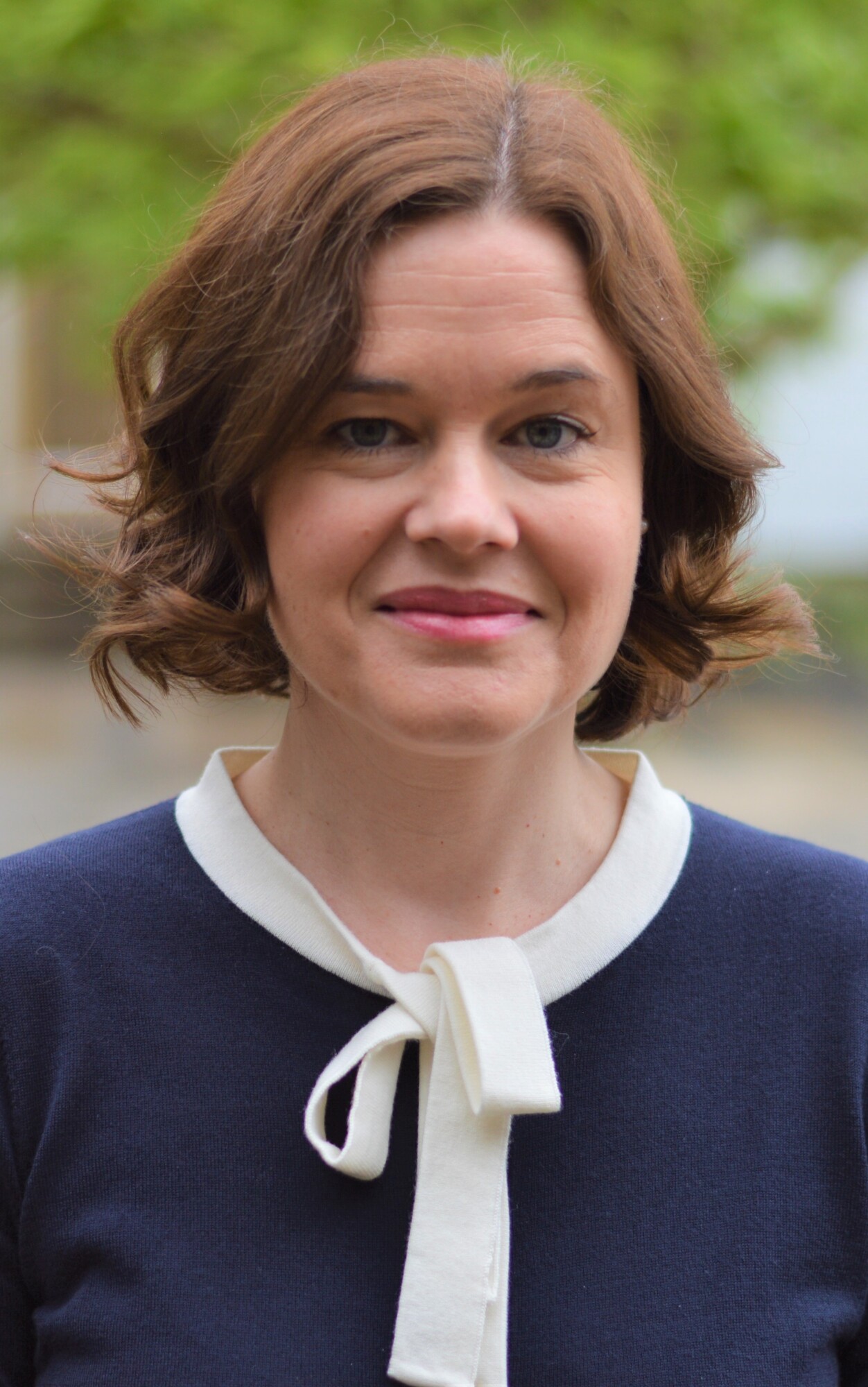
It is alarming to learn that 55% of young people in the UK encounter obstacles when seeking mental health support. At Pilgrims, we firmly believe providing mental health and wellbeing support to our children is just as essential as their education.
The theme for this year’s Children’s Mental Health Week, My Voice Matters, is about empowering children by providing them with the tools they need to express themselves.
Feeling empowered can have a positive impact on our wellbeing. Children who feel their voices are heard and can make a difference have a greater sense of community and self-esteem.
Earlier this week Mr Orr and I held a school assembly to share why looking after our wellbeing is so important.
Throughout this week, the children will engage in various activities aimed at fostering self-expression and wellbeing. From art, drama and dance to writing and open discussions, we’re providing platforms for our children to articulate their emotions.
We will also introduce them to various mindfulness techniques, including breathing exercises and designated calm time – all designed to enhance their overall well-being.
At Pilgrims we work closely with Making Me, a charity which provides our school with invaluable help and support throughout the year. The charity is passionate about children’s mental health and at Pilgrims we follow their emotional resilience programme.
The initiatives we work on with Making Me encourage the children to talk about their feelings. We also work alongside all teachers and staff within school to ensure we are providing the correct support to those who need it – and we perform regular assemblies and workshops to keep parents up to date.
On Friday, we are inviting the children and staff to come dressed to express. The day will celebrate individuality and self-expression, whether that is through dance, music, art or simply wearing clothes that reflect their personal style.
As part of this expressive day, we are kindly asking for a minimum donation of £1 to Making Me for its continued support.
Contributions can be made in school, or through the charity’s Just Giving page here.
If you’d like to find out more about the work the Making Me charity do to support children’s mental health, you can visit their website here. Alternatively, if you have any other questions, please call us on 01234 369555.
Beyond the joy it brings, music has been proven to have a positive impact on the cognitive, emotional and social development of children in Early Years education. And that’s why it plays a big role in our curriculum at Pilgrims.
Here, our Head of Early Years, Miss Goodwin, alongside our Head of Music, Mrs Knight share some of the ways music can boost development for children.
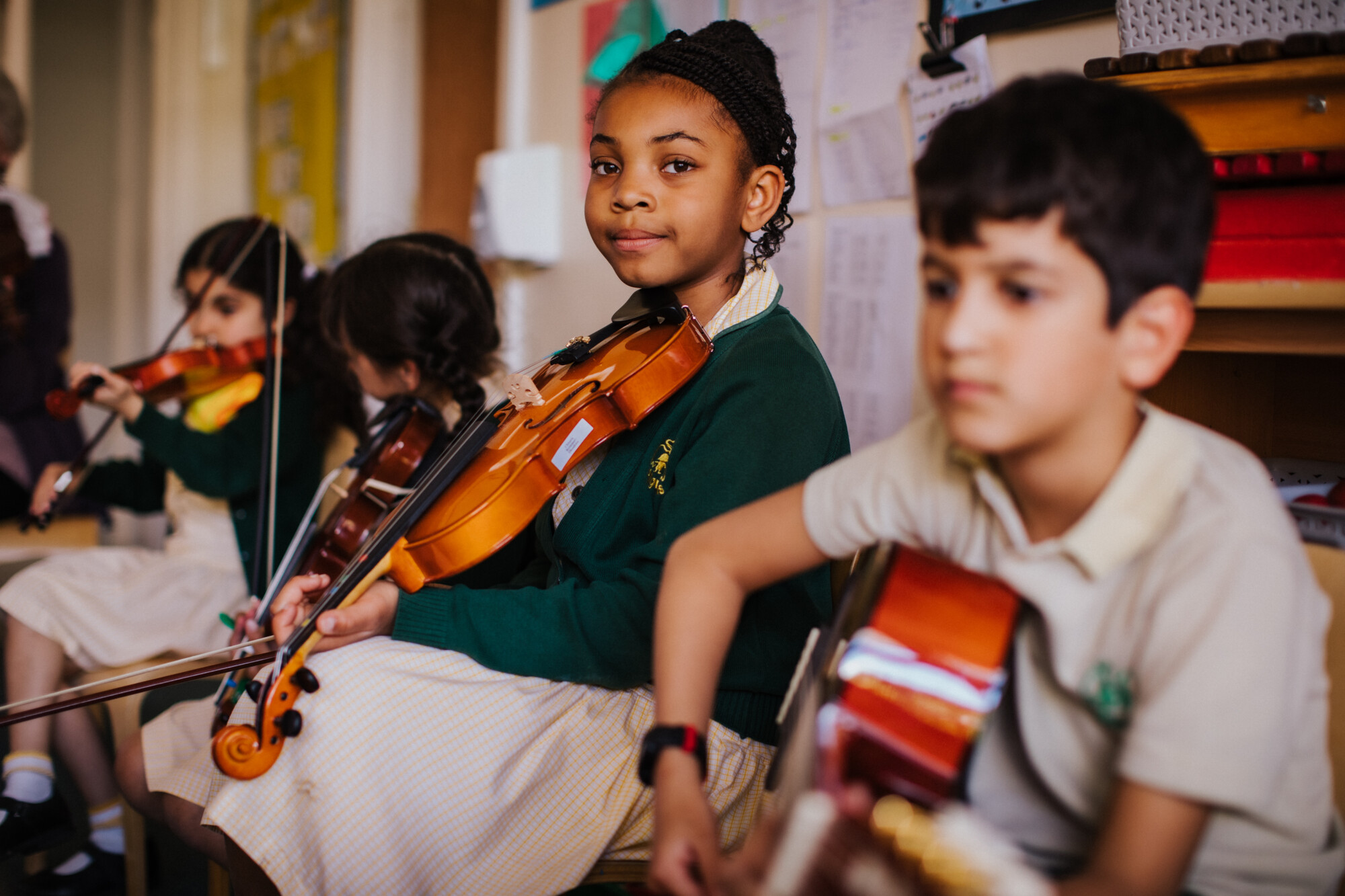
Cognitive development
Music engages various areas of the brain, promoting cognitive development from a very early age. From memory and pattern recognition to problem-solving, the exposure to music creates a cognitive playground.
Emotional development
Music also helps children express and understand their emotions – plus, it’s a great tool for encouraging self-expression.
At Pilgrims, we encourage our children to connect with their feelings in a safe and supportive environment.
Whether through singing, playing instruments or rhythmic movements, the children learn to express themselves creatively, fostering emotional intelligence and resilience.
Social skills
Collaborative musical activities promote teamwork, cooperation and social interaction.
At Pilgrims the children enjoy group singing, playing instruments and rhythmic games, creating opportunities for them to engage with one another.
These shared musical experiences build a sense of community, encourage communication and help children develop positive relationships with their peers.
Motor skills
Engaging in musical activities involves fine and gross motor skills, contributing to physical development.
Our children participate in activities such as clapping, dancing and playing simple instruments, enhancing their coordination and motor skills.
These activities not only make learning enjoyable but also prepare children for more complex physical challenges as they progress through their educational journey.
Language skills
Songs and rhymes also expand a child’s vocabulary.
The repetition in popular rhymes and songs helps children to memorise new words. They also become familiar with language patterns and how words are placed together.
A well-developed vocabulary enables children to communicate effectively and learn to read with greater fluency and comprehension.
At Pilgrims Pre-Prep, we are committed to providing a rich musical environment that nurtures the mind, body and development of each child.
Through the integration of music into our curriculum, we are sowing the seeds for a lifelong love of learning and creativity.
Learn more about our Early Years offering here.
At Pilgrims, no two days are the same when you work with little people. From gardening to storytelling, to playing in the mud kitchen, our Early Years Practitioners have heaps of fun.
Here, Early Years Practitioner Mrs Hotti takes you through a Day in her life at Pilgrims.
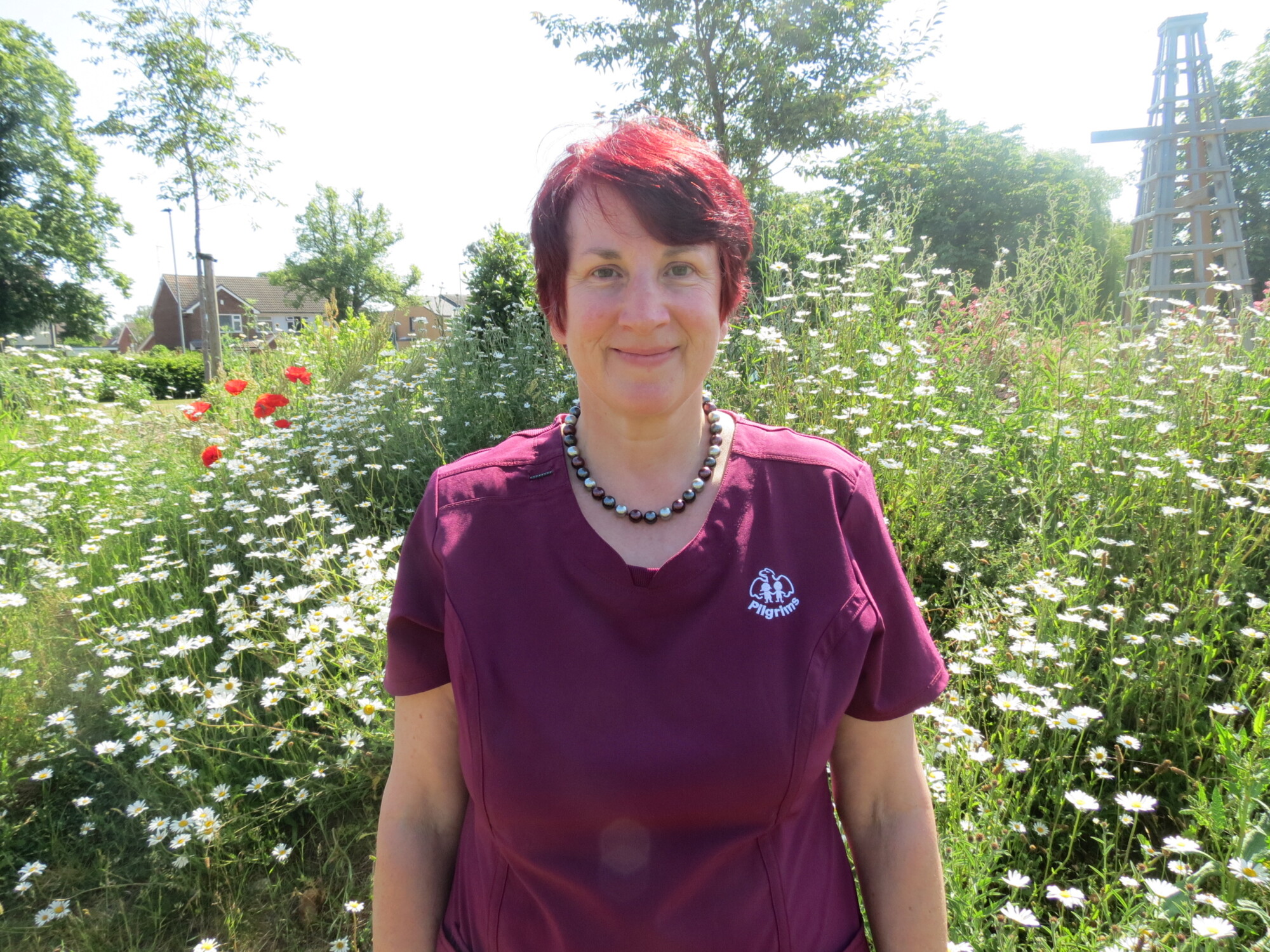
Every day is a new adventure as an Early Years Practitioner. As I step into the school, I am filled with anticipation, wondering what role I will play in the children’s imaginative worlds today. Will I be a hairdresser, a storyteller, a gardener, or a chef in the mud kitchen? The possibilities are endless, and that’s what makes every day at Pilgrims unique.
Each morning begins welcoming all the beaming children to school. It’s also a wonderful opportunity to connect with parents, fostering strong relationships and building a close-knit community with families.
Today, our day kicked off with outdoor adventures. Armed with waterproofs and wellies, I helped the children gear up for a day of exploration and play in the great outdoors.
Tea parties are a must, with the children learning the art of pouring and filling their cups and experiencing the joy of pretend play in the fresh air.
Arts and crafts follow, with pipe cleaners, paper and glitter transforming into imaginative masterpieces. Our adventures continue as we delve into water play, sparking curiosity about the objects floating and sinking.
After all the excitement, it was time for a well-deserved snack break, fostering social interactions and sharing among the children. It was then time for a quick tidy-up. Tidying up is a team effort at Pilgrims, teaching the children the importance of responsibility.
Following that, I began my dedicated non-contact period, during which I stepped away from direct interaction with the children to note down observations for sharing with parents. Additionally, I utilise this time to engage in training sessions and collaborate with colleagues to brainstorm fresh activity ideas.
Then I returned to the children and we joined Mr. Carr for an IT lesson. Today’s challenge was colouring a leaf on the computer, helping the children to develop their fine motor skills.
Then it was time for lunch! Lunchtime is not just a meal – it is a chance to connect with the children and discuss the morning’s activities. On the menu today was some tasty arrabbiata chicken with pasta. I enjoy these moments of conversation over food.
After lunch, the fun moved inside. The afternoon began with a story and today’s enchanting tale was ‘The Gruffalo’. The children sit transfixed while I read their stories aloud. Witnessing the children captivated by the story is immensely rewarding and I love to share my love for literature with them.
It was then time for a 1:1 meeting with my line manager. These sessions serve as a valuable opportunity to delve into the aspects of my role that I find fulfilling, explore potential future training opportunities and provide a space for me to discuss my ongoing Level 3 Early Year Practitioner course. Being at the beginning of this course, it’s particularly beneficial to have a dedicated time to talk through my progress.
Then, it was off to Mrs. Ellis’ garden, where the children discovered the magic of planting seeds, watching them grow, and eventually harvesting the fruits and vegetables. At Pilgrims, we believe that you’re never too young to develop green fingers.
As the children’s day came to a close, it was time to greet all the parents. It is lovely to tell them what their child has done during the day, including their various activities and achievements. After our catch up it is time to wave goodbye knowing that tomorrow holds another exciting day brimming with new adventures.
Reflecting on my day, I am grateful for the variety of experiences I share with the children.
At Pilgrims, the emphasis is on fostering kindness, curiosity and respect.
So, what could you bring to Pilgrims? A passion for nurturing young minds, a love for adventure and the ability to embrace the unexpected with a smile.
Join us at Pilgrims, where every day is a new adventure in the wonderful journey of early childhood education.
Visit our careers page here.
We are feeling festive at Pilgrims! The children have been singing lots of carols, the school productions are in full swing, and we are looking forward to our Christmas lunch.
Here, our Headteacher Mrs Webster shares some of the fun and festive activities happening at Pilgrims and how you can keep the Christmas spirit going at home throughout the holidays.
Deck the halls with Christmas crafts
Our little artists at Pilgrims have been busy unleashing their creativity to transform the school into a winter wonderland!
Engaging in a variety of Christmas crafts, the children have been practicing their fine motor skills by cutting out snowflakes, creating Christmas tree collages – and even trying their hand at their own interpretations of Van Gogh’s Starry Night.
The classrooms and corridors are now filled with their beautiful creations, spreading festive cheer throughout the school.
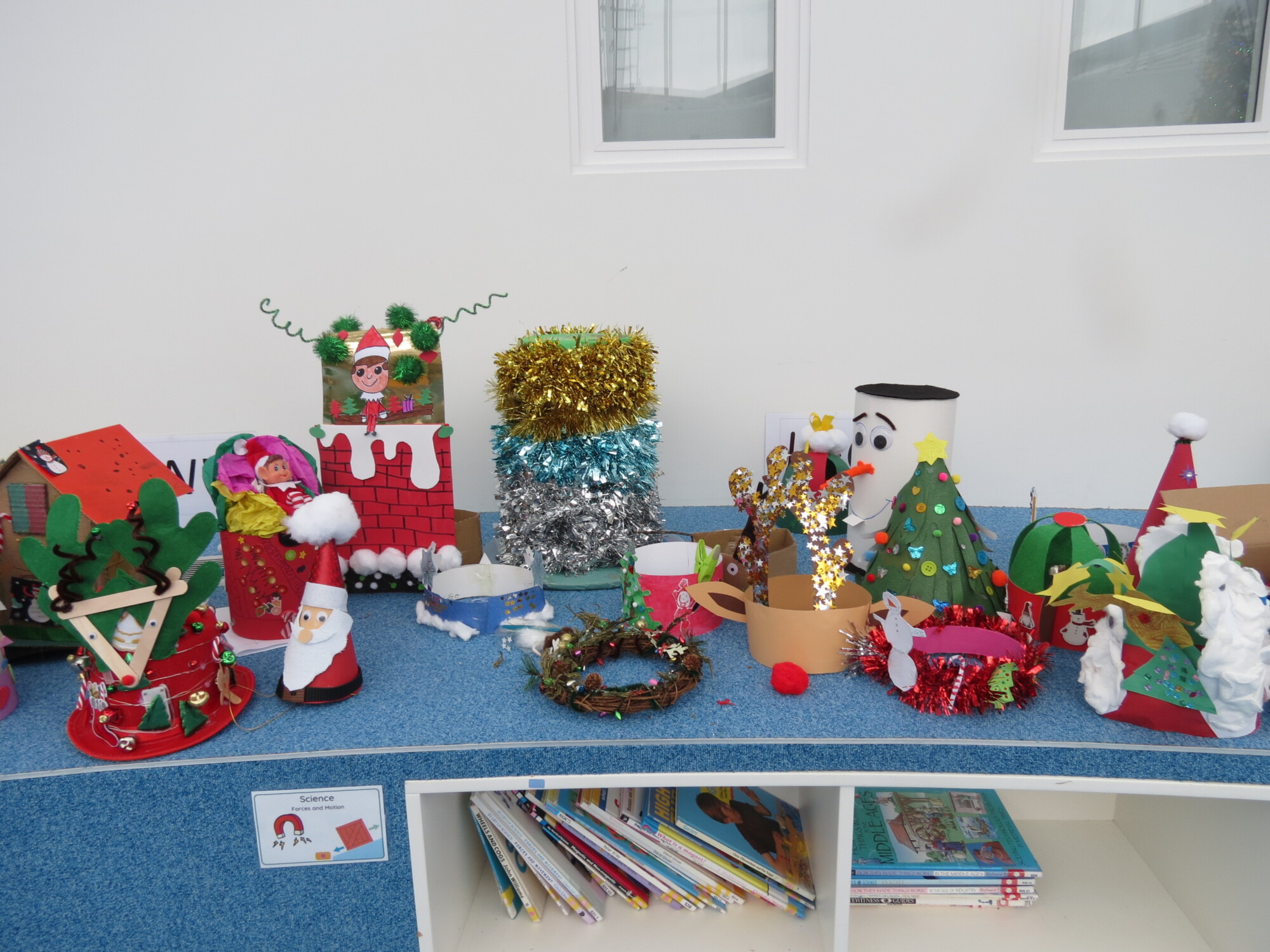
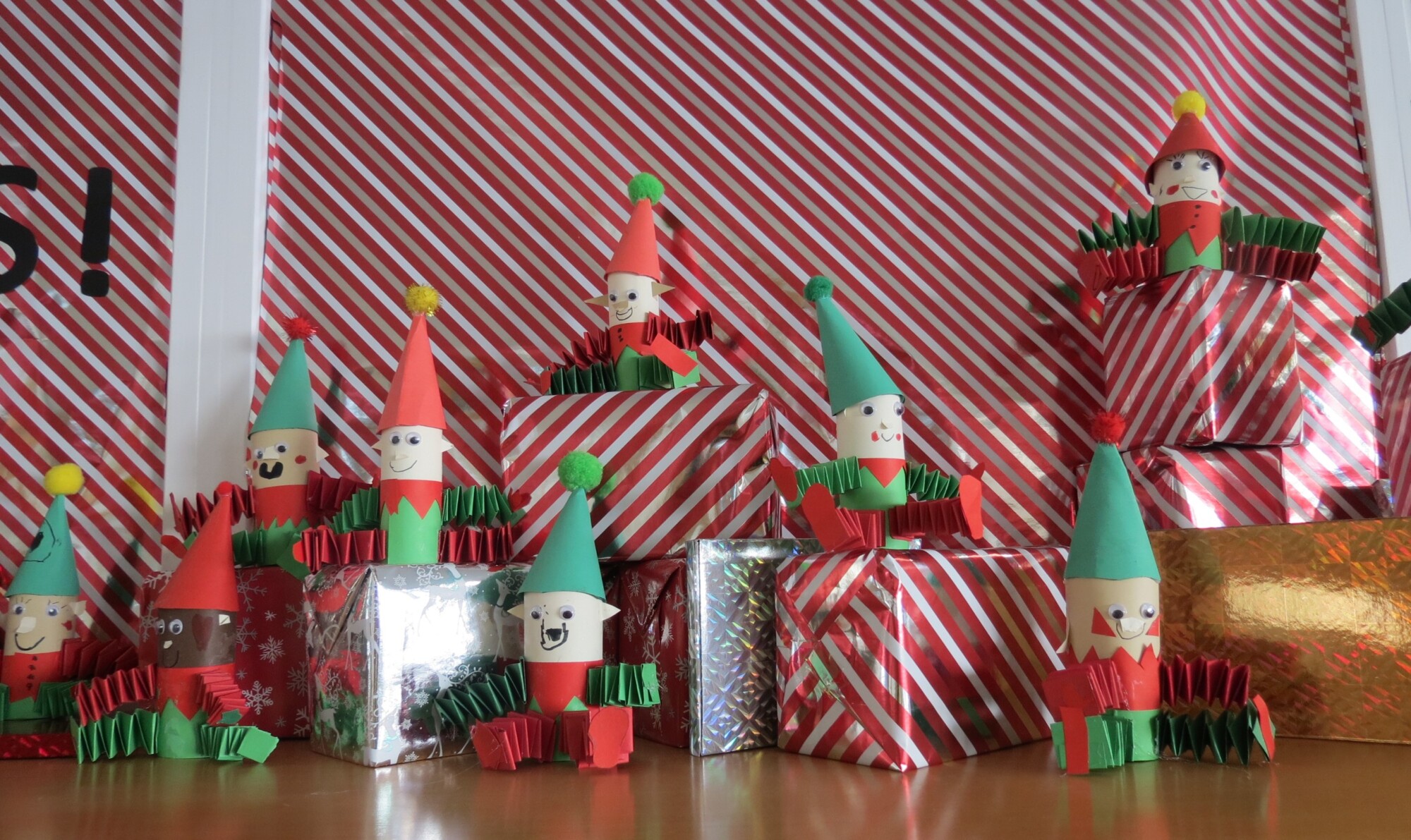
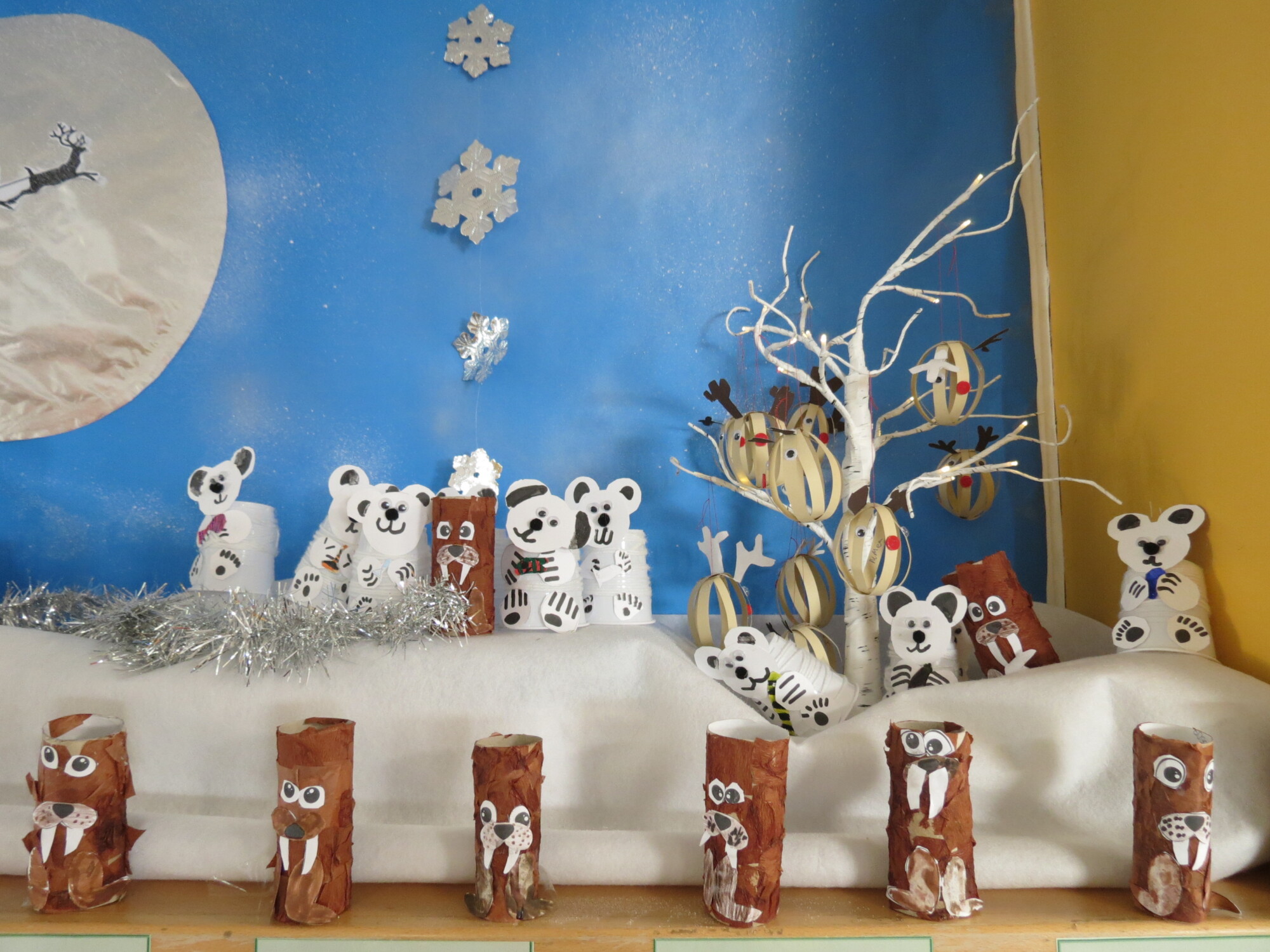
Spreading joy to the community
We believe in the spirit of giving back – and our children have been spreading joy beyond the school walls.
The Year 2 choir visited Airedale nursing home, treating the residents with enchanting Christmas carols. The joyous occasion included the creation of Christmas cards, leaving a lasting impression on both the children and the grateful residents.
The Year 1 choir also brought smiles to the faces of residents at Maydenbury retirement home, singing carols and creating personalised Christmas cards.
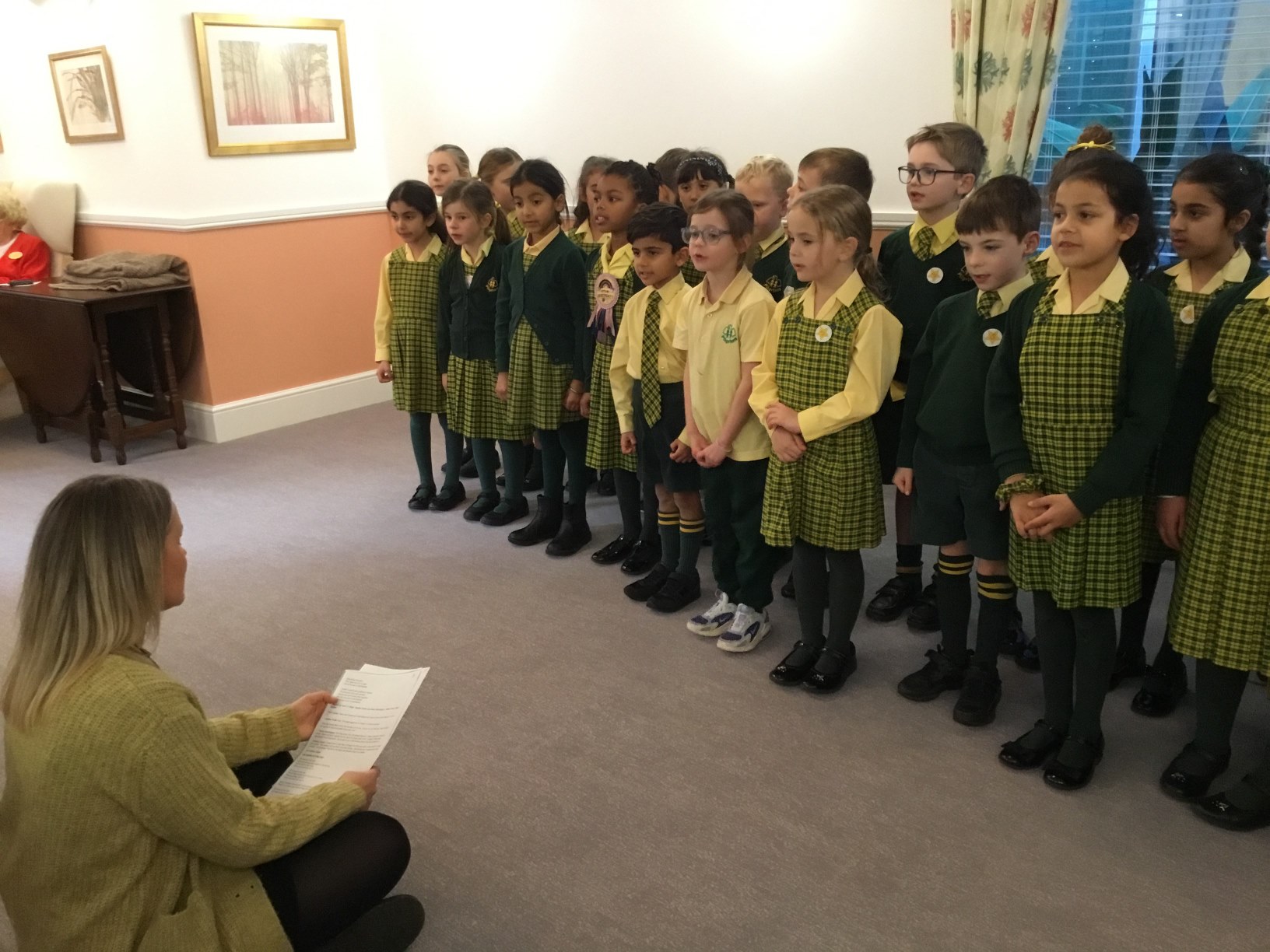
Bedford Christmas Tree Festival
Pilgrims took part in the Bedford Christmas Tree Festival at St Paul’s Church, showcasing a dazzlingly decorated tree under the theme ‘Kings and Queens’.
Visitors enjoyed the festive display from December 6 to December 10, with admission proceeds helping to raise funds for new equipment at Bedford Hospital as well as supporting the upkeep of St Paul’s Church. Last year, an incredible £20,000 was raised so they are hoping for the same again this Christmas!
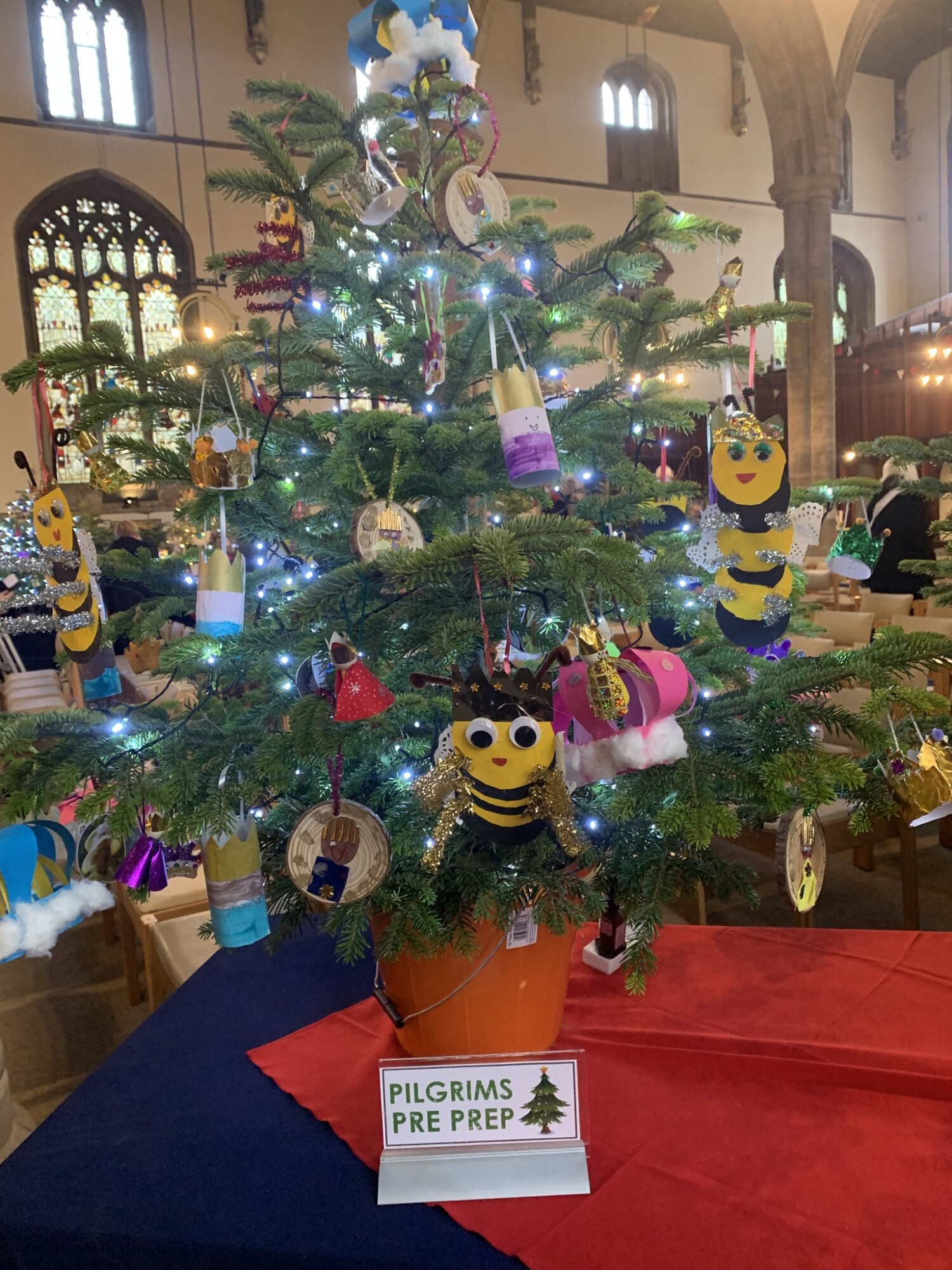
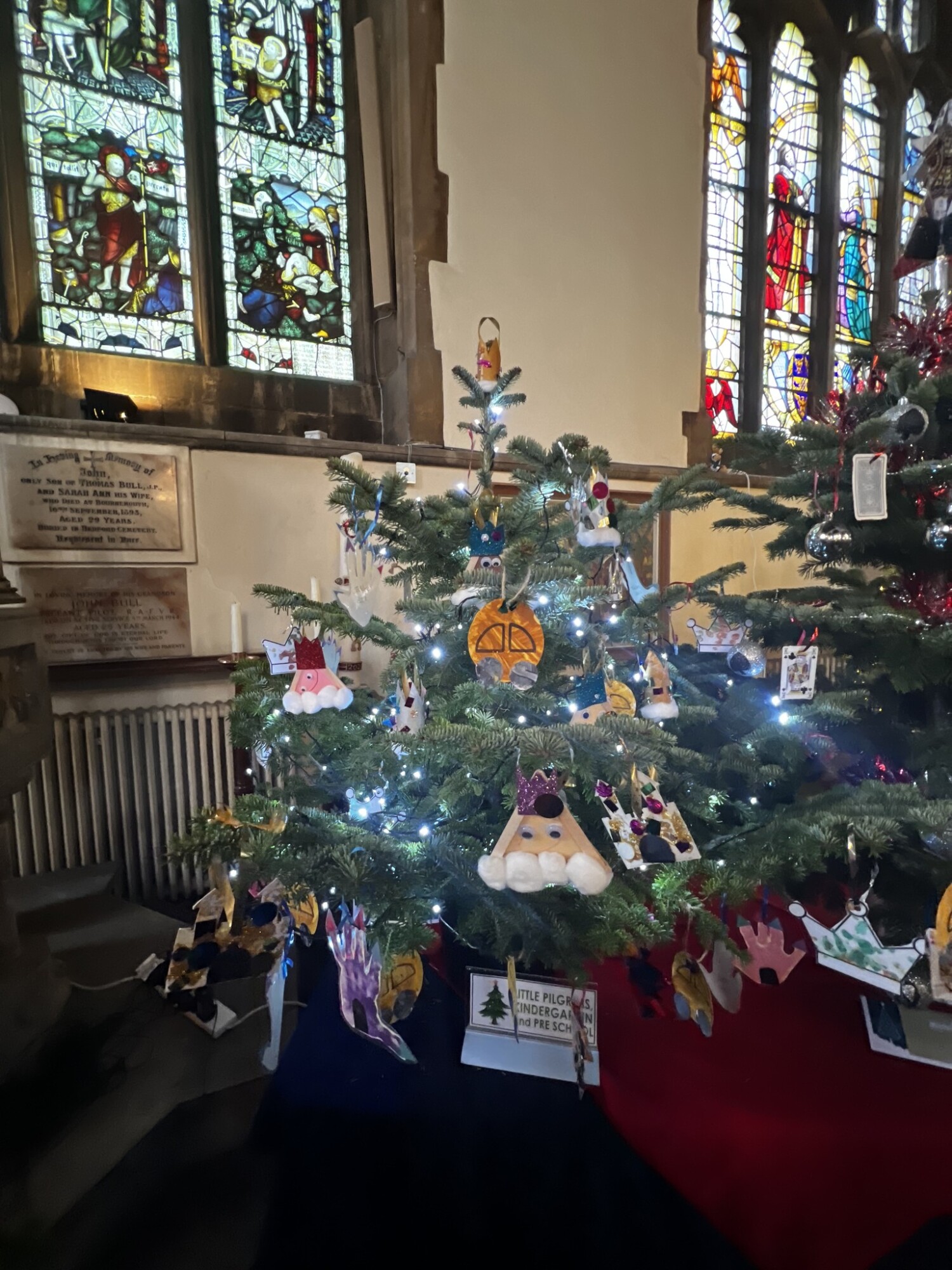
Christmas activities at home
There are so many festive activities for the children to do during the Christmas break that are just as fun as they are educational.
If you haven’t already put your tree up, why not decorate it together as a family? When it’s up, you can help your children to make their own tree decorations, such as lollipop stick snowflakes, twig reindeer ornaments or cinnamon stick trees. Or perhaps, ask your child to create their own artwork. For example, they could make a thumbprint Christmas tree using paint or ink, cut out and put together a handprint wreath or paint their feet to create a mistletoe keepsake.
Christmas is also the perfect time to do some cooking and baking at home. In addition to the traditional Christmas cake and Yule logs, why not try Mrs Bhogal’s Christmas shortbread recipe?
From everyone at Pilgrims we wish you a truly magical and heart-warming Christmas.
‘Tis the season to be jolly indeed!
At Pilgrims, we are big believers that there is no limit to our ambitions. That’s why, as part of the Reception children’s autumn term topic ‘Me and My World’, we asked them to come to school dressed as what they would like to be when they grow up.
The day not only ignited their imagination but allowed them to share their dreams with their friends and teachers. They were also inspired by our parents who kindly visited the children to talk about the many different jobs they do; from teachers to doctors, from beauticians to paramedics, from dentists to pilots – they all talked so enthusiastically about their jobs, giving the children a little glimpse into what they might be when they grow up.
Here, Pilgrims’ Headteacher, Mrs Webster, reveals what the children chose and why.
A diverse range of dreams
All the children looked fantastic in their costumes. If anyone needed medical assistance, they could find all the doctors, nurses, dentists, and paramedics at Pilgrims.
I spoke with many of the children and asked them about their future aspirations. Their responses were wonderful and I am so proud of the way they shared their ambitions.
“I want to look after animals because I love them lots.”
One of the children shared their desire to care for animals. Dressed as a veterinarian, she proudly expressed her passion for our furry and feathered friends.
She said: “I want to look after animals because I love them lots.”
It was heartwarming to witness her enthusiasm for animals, which highlighted the significance of instilling empathy and compassion in our children.
“I’m a firefighter because they are brave and so am I.”
Several children were dressed up and ready to tackle the imaginary flames as they aspired to be firefighters.
When I asked one of the children why they chose to be a firefighter, they replied with confidence: “I’m a firefighter because they are brave, and so am I.”
The children’s strong self-belief and courage shows just how determined they are to follow their dreams.
“Can you guess what I am? I’m an astronaut and I will be going to the moon soon.”
One child entered the school dressed in a space suit, brimming with excitement.
They exclaimed: “Can you guess what I am? I’m an astronaut, and I will be going to the moon soon.”
They shared their dreams of exploring space, and it was wonderful to see how curious and eager they are to discover the world around us.
“I’m going to be a farmer when I grow up – I will grow vegetables and maybe have some cows or sheep.”
Dressed in his farmer’s attire, one child shared their dreams of cultivating the land and raising animals.
He said: “I’m going to be a farmer when I grow up – I will grow vegetables and maybe have some cows or sheep.”
At Pilgrims, we encourage children to explore their surroundings – and one way we do this is through planting fruits and vegetables. By nurturing plants in our school garden, I hope this child remembers the gardening club when he has his own successful farm.
All in all, this was a brilliant day for everyone at Pilgrims. Not only did it highlight how ambitious the children are – it showed the belief in their own potential.
At Pilgrims Pre-Prep, our supportive and nurturing environment empowers these children to embrace their dreams, to reach for the stars and achieve their goals.
We can’t wait to see the next generation of teachers, medics, explorers, scientists and more, flourish.
The new academic year has begun at Pilgrims Pre-Prep, and we are filled with excitement as we begin a journey of learning and discovery.
Pilgrims’ Headteacher, Mrs Webster, explains a little more about what the children can look forward to over the next term.
I have really enjoyed hearing all about what the children have been up to during the summer holidays! Now, as they return to school, brimming with energy and enthusiasm, we have a host of great activities lined up for them throughout the autumn term.
Reception
This term in Reception, the children will be discovering all about themselves and their world.
To kickstart their learning, we’ll be taking a trip down memory lane to when they were babies. At home, you can get involved by creating a family tree to help your child identify their various family members.
Later in the term, we will also be looking at the seasons and different celebrations, tying this in with Christmas and all the excitement that comes with it!
This term is filled with many outdoor adventures, enlightening guest speakers, brain-teasing problem-solving exercises, visits to our local park and imaginative dress-up sessions.
We can’t wait to watch the children’s confidence grow and see all the fun they have this year!
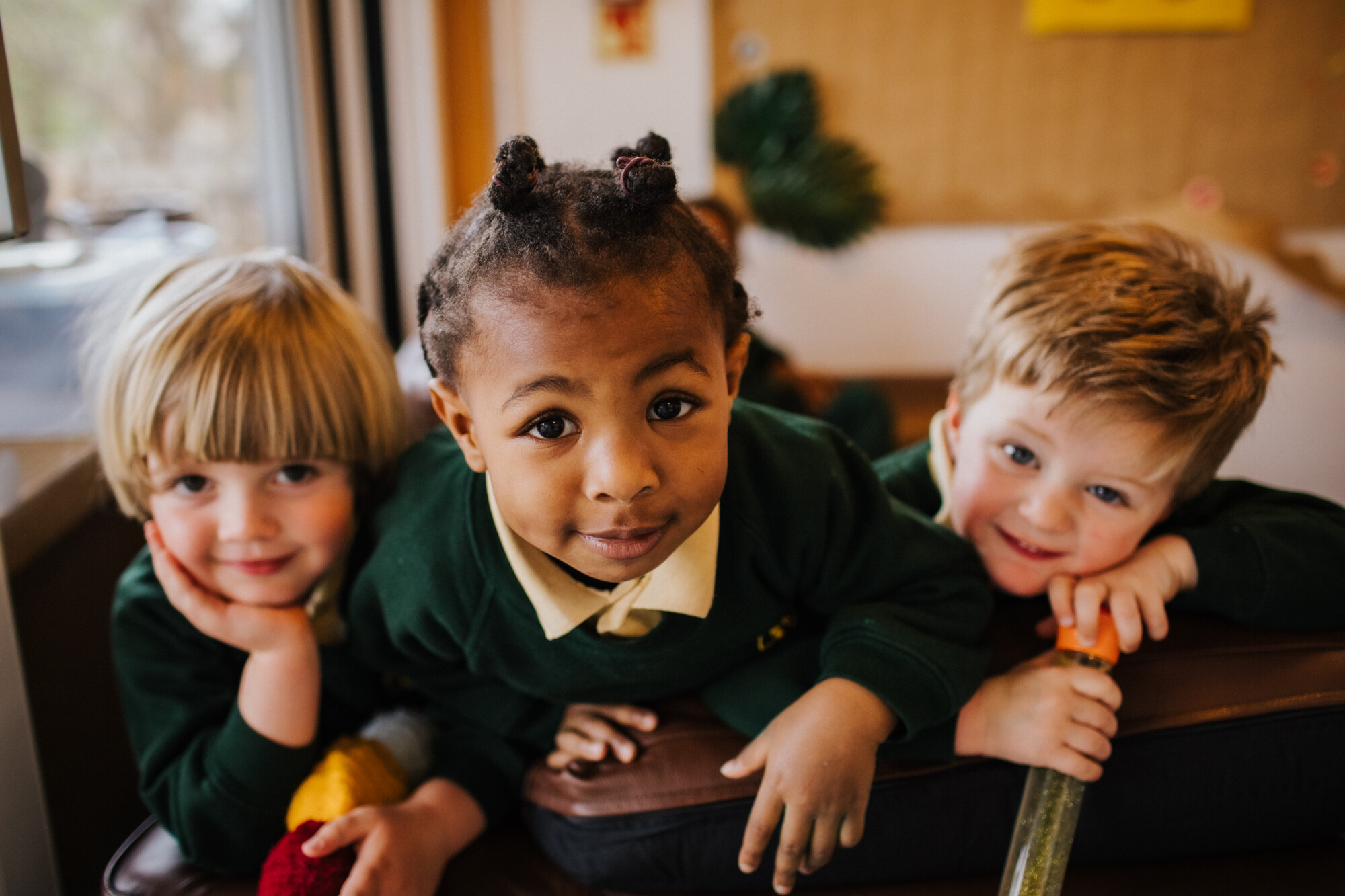
Year 1
We are thoroughly impressed with how well our Year 1 children have settled into the new academic year.
We started the term by getting to know each other better and embarking on the exciting ‘Little Jar of Me’ project. It has been interesting to find out all about the children’s favourite toys, animals and colours, as well as their hobbies and families.
This term, the children will be learning all about castles and knights with the theme ‘Oh What a Knight’.
The children will have their very own ‘castle day’ and explore the fascinating world of medieval castles.
Perhaps you could visit a real-life castle over half-term? There are also lots of interesting books to read including Secret World: Castle (interactive flip through book) and The Amazing World of Castles by Barbara Taylor.
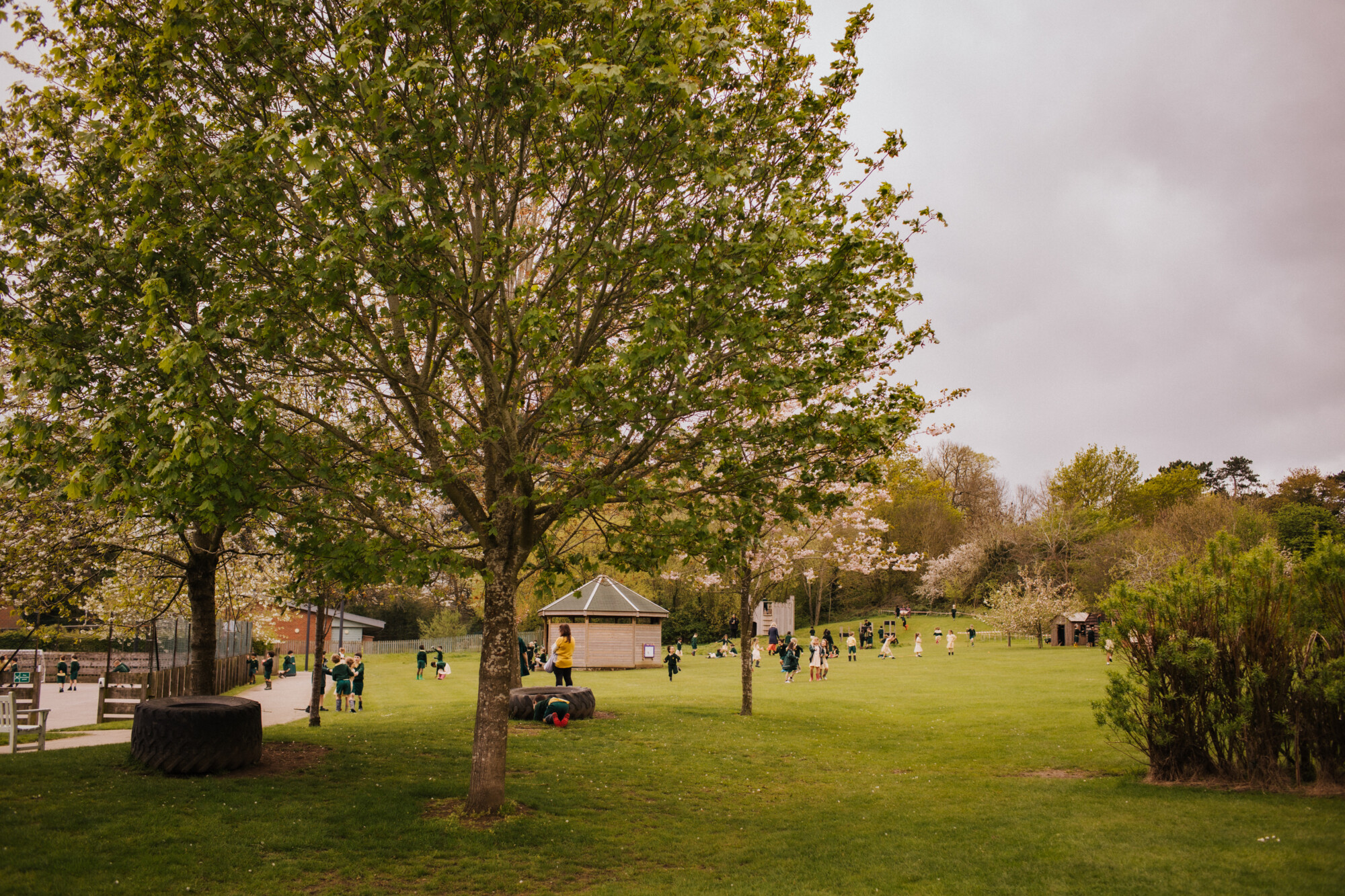
Year 2
In their final academic year at Pilgrims, the children in Year 2 will be learning about the Arctic and the Antarctic as part of their ‘Pole to Pole’ topic; from the animals and people who may live there, to creating artwork inspired by the amazing Aurora Borealis.
You might like to join in at home with our learning by drawing polar animals, watching Frozen Planet, or reading books such as Ernest Shackleton by Manan Isabel Sanchez. You could even keep a daily diary during the half term of the temperatures in Antarctica compared to the UK. Would you rather live in the North Pole or the South Pole?
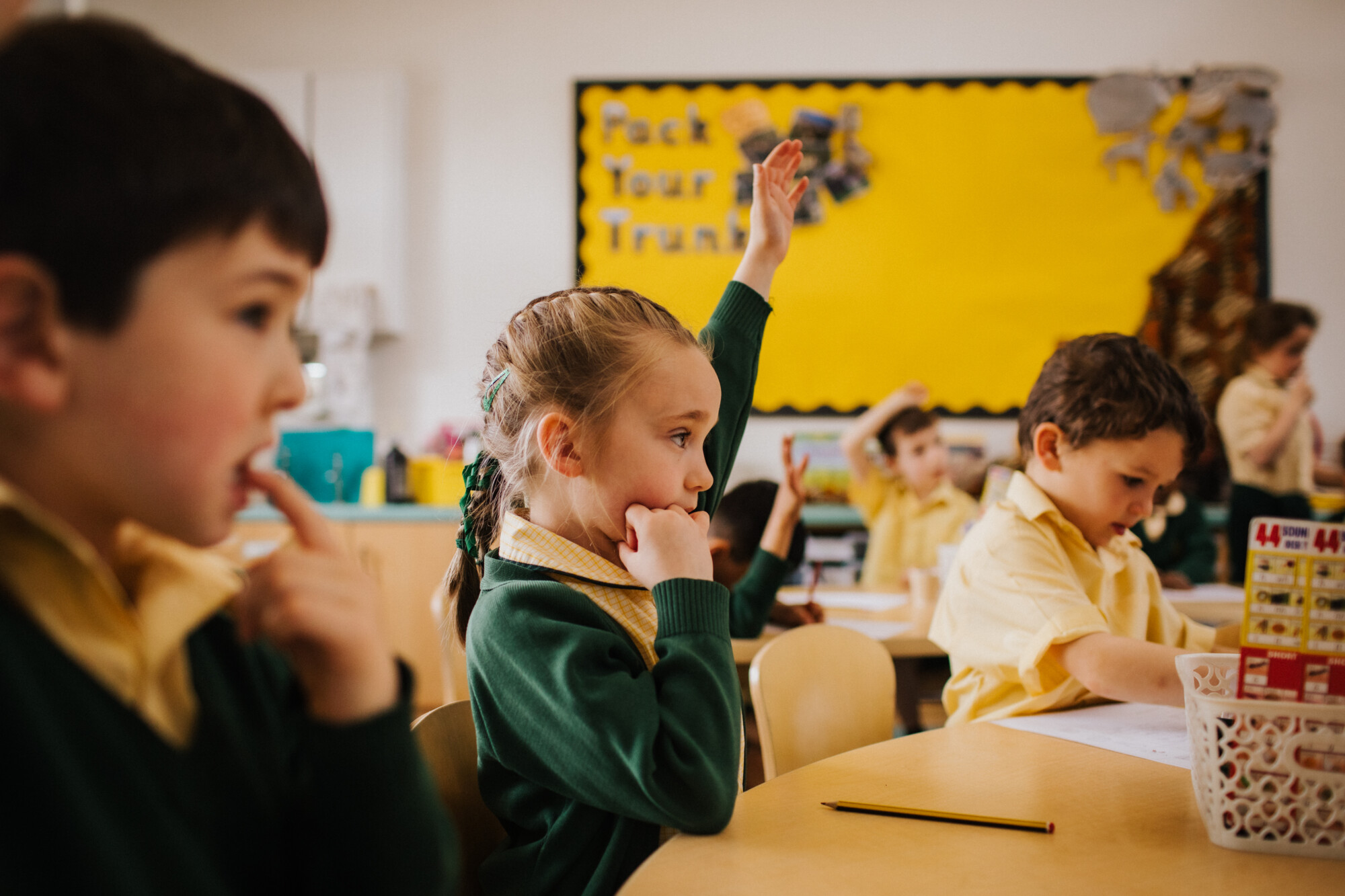
Welcome everyone to the new academic year at Pilgrims – I am excited to watch and learn new things too!
After a great summer holiday, starting back at school can be a little daunting – but it also marks the start of an exciting new chapter for your child. Before you know it, they will be making friends, learning new skills, and becoming more independent.
Here, Mrs Webster, the Headteacher at Pilgrims School, shares five helpful tips on how to get your child ready for their first day back at school.
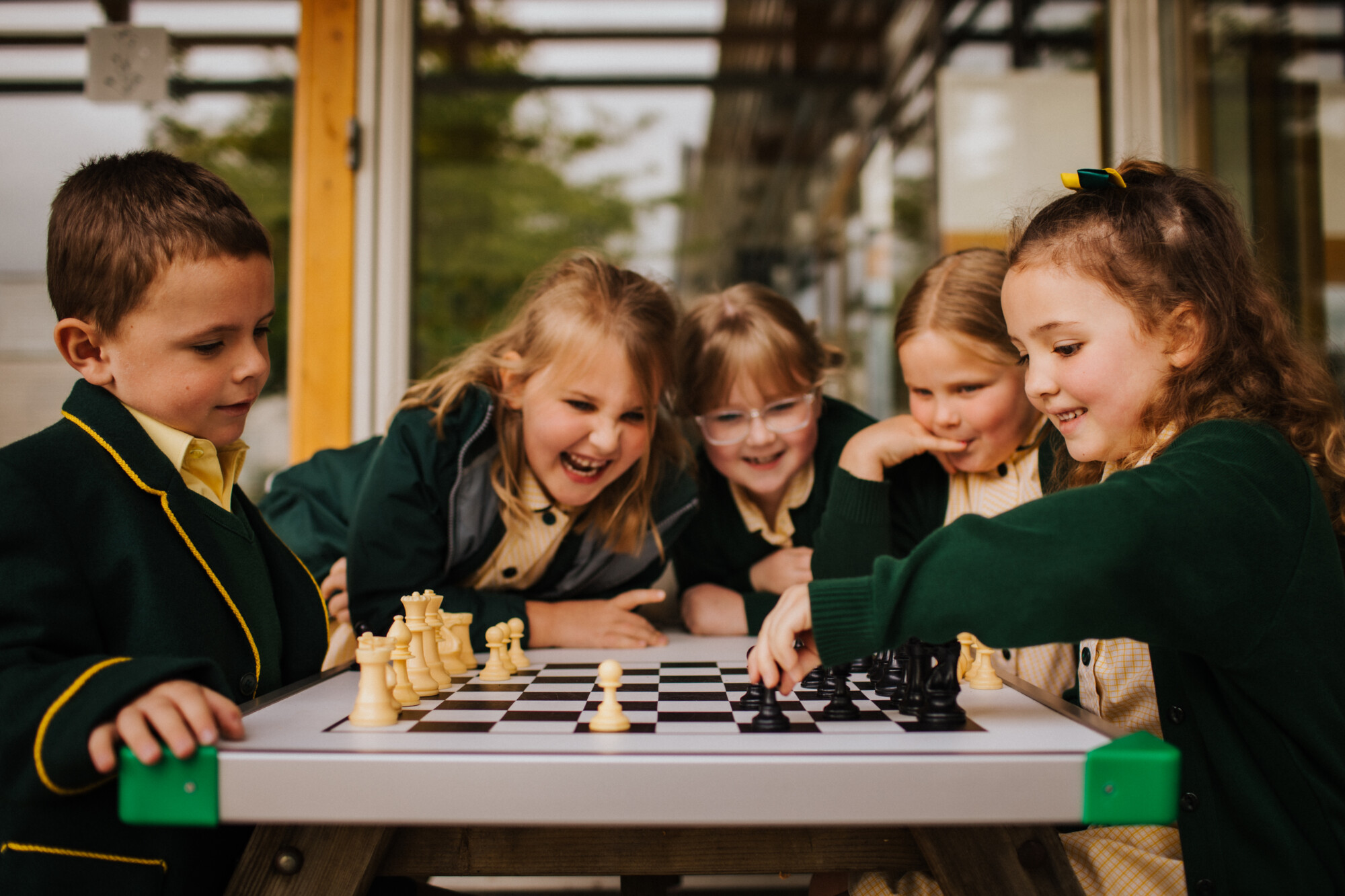

1. Support your child’s independence
As your child prepares to return to school, it is important to help build their confidence in completing basic tasks independently.
Encourage them to dress themselves and, for ease, try to avoid clothing with complicated buttons or buckles.
It is also a good idea to have them practice putting on their school uniform ahead of their first day.
Perhaps you could ask them to find and put aside everything they think they need for school (uniform, bag, pencil case?)
2. build up your child’s social skills
In anticipation of your child settling in to their new class and making new friends, help them develop their social skills.
Role-playing with toys can be a great way to practice starting conversations and introducing themselves to new classmates and adults.
It is a good idea to set aside time each day to practice conversations, allowing your child to talk while also teaching them to listen.
You could take turns sharing the best part of your day and encourage your child to ask questions to learn more.
3. introduce a routine
During the summer holidays, it is natural for routines to become more relaxed and bedtimes to be pushed back.
However, to prepare your child for the return to school, it is helpful to reintroduce a routine that aligns with school timings. This will ease your child back into mealtime and bedtimes.
We suggest starting this routine at least a week before school begins to give your child time to adjust gradually.
4. Talk to your child about school
Discuss the exciting activities and experiences they can look forward to, which can help alleviate any back-to-school apprehension.
Ask them what they are looking forward to and what they are interested in learning, along with any worries they might have.
It can also help to regularly remind your child they are going back to school, so they feel ready for the day.
5. read a book about starting school
Reading stories with characters attending their first day of school is useful for relieving first-day nerves and providing a boost of confidence where needed.
You can find a list here of books the Book Trust have suggested for children who are starting school to help them feel more prepared.
A great tip is to read these books aloud, allowing your child to share their thoughts and feelings about the upcoming school year.
We are all looking forward to welcoming the children back to school. We can’t wait for another successful term and to see all the great things the children will achieve!

